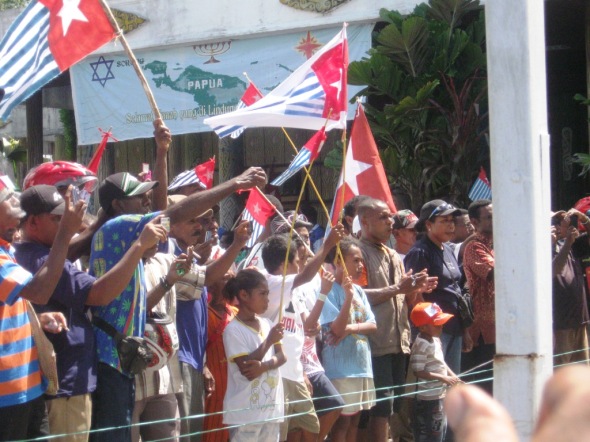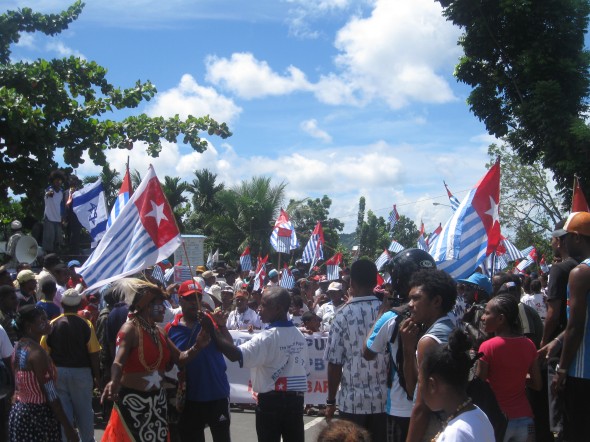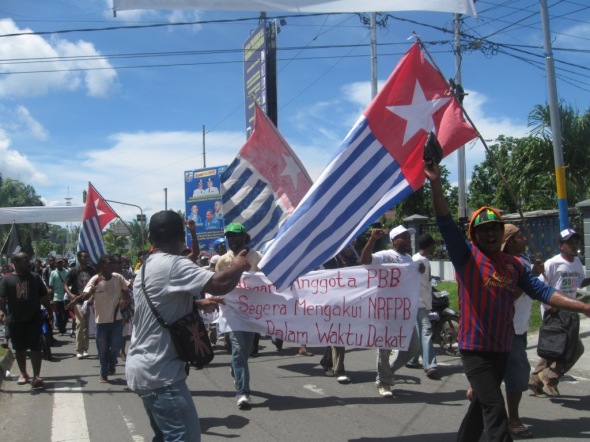Key visit to Indonesia and West Papua |
Key visit to Indonesia and West Papua
Indonesia Human Rights Committee,
Indonesia Human Rights Committee,
14 April, 2012
Media Release : Prime Minister John Key urged to raise human rights issues in West Papua during his forthcoming visit to Indonesia .
Prime Minister John Key must not overlook the ongoing suffering, killings and gross restrictions of fundamental freedoms in West Papua when he talks to Indonesian Government leaders. IHRC has faxed him a letter on the eve of his departure to highlight recent gross injustices – including military sweepings and the arrest on trumped up ‘treason’ charges of respected Papuan leaders. Letter follows
13 April, 2012
Rt Hon John Key,
Prime Minister,
Parliament Buildings,
Wellington .
Prime Minister,
Parliament Buildings,
Wellington .
Dear John Key,
We understand that you are about to visit Indonesia , and this morning’s media report suggests that you will seek to encourage a ‘warmer’ relationship.
Your visit follows that of the British Prime Minister David Cameron, who chose the occasion of his visit to announce the relaxation of arms exports to Indonesia as a recognition of Indonesia’s ‘democratic progress’. This move has been condemned by human rights groups as a threat to the interests of the people of West Papua , who have been on the receiving end of Indonesian military violence for decades.
New Zealand has a special responsibility not to forget our Melanesian neighbours in West Papua . We must not overlook ongoing human rights issues, in the rush to acknowledge the positive changes that have taken place in Indonesia post Suharto.
Indonesia maintains a hugely disproportionate military presence in West Papua – including crack Special Forces (Kopassus) troops - and restricts outside access, but these days with video and digital technology the reports of abuses cannot be easily suppressed. The Indonesian military has recently conducted ‘sweep operations’, in the Central Highlands of West Papua . These attacks destroy homes, churches, and traditional meeting places, while forcing villagers to flee into nearby forests for security, at the risk of starvation and disease.
According to the data collected by British human rights group, TAPOL, since 2008 at least 80 Papuans have been arrested and charged with ‘treason’ or related offences simply for peaceful actions such as raising the Papuan Morning Star Flag. They have been imprisoned for terms ranging from 10 months to six years. For example, Filep Karma, a civil servant, and Amnesty International ‘prisoner of conscience’ was arrested in December 2004, convicted of treason and sentenced to fifteen years in jail.
Your visit follows that of the British Prime Minister David Cameron, who chose the occasion of his visit to announce the relaxation of arms exports to Indonesia as a recognition of Indonesia’s ‘democratic progress’. This move has been condemned by human rights groups as a threat to the interests of the people of West Papua , who have been on the receiving end of Indonesian military violence for decades.
New Zealand has a special responsibility not to forget our Melanesian neighbours in West Papua . We must not overlook ongoing human rights issues, in the rush to acknowledge the positive changes that have taken place in Indonesia post Suharto.
Indonesia maintains a hugely disproportionate military presence in West Papua – including crack Special Forces (Kopassus) troops - and restricts outside access, but these days with video and digital technology the reports of abuses cannot be easily suppressed. The Indonesian military has recently conducted ‘sweep operations’, in the Central Highlands of West Papua . These attacks destroy homes, churches, and traditional meeting places, while forcing villagers to flee into nearby forests for security, at the risk of starvation and disease.
According to the data collected by British human rights group, TAPOL, since 2008 at least 80 Papuans have been arrested and charged with ‘treason’ or related offences simply for peaceful actions such as raising the Papuan Morning Star Flag. They have been imprisoned for terms ranging from 10 months to six years. For example, Filep Karma, a civil servant, and Amnesty International ‘prisoner of conscience’ was arrested in December 2004, convicted of treason and sentenced to fifteen years in jail.
We have been writing to you and to Foreign Minister Mc Cully to urge you to speak out about the events in October 2011, when the Third Papuan People’s Congress was held in Jayapura, attended by hundreds of people from across the country. This peaceful Congress was violently dispersed by police and army troops who opened fire without any provocation and killed at least three people.
Since then some 17 police personnel have received ‘administrative sanctions’ but no one was held accountable for the deaths, or for the unprovoked violence which caused injuries to at least 90 people or for the arbitrary arrest of some 300 people.
The Indonesian military continue to enjoy impunity, while the five Papuan leaders (Selfius Bobii, Agus Kraar, Dominikus Sorabut, Edison Waromi, and Forkorus Yoboisembut) , who were taken into custody following the Congress were put on trial, found guilty of treason and last month sentenced to three years in prison.
We believe that the decision to convict and imprison these men for their involvement in an entirely peaceful event decision flies in the face of Indonesia ’s professed commitment to international human rights norms. Declaring a wish or commitment to freedom and independence is not ‘treason’.
Indonesia is a signatory to International Covenant on Civil and Political Rights (ICCPR), which guarantees the rights to freedom of expression and peaceful assembly and Indonesia ’s constitution also protects these rights.
We understand that New Zealand diplomatic representatives have monitored events in West Papua and followed (but did not observe) the conduct of this trial. So you will be aware of the many criticisms of the trial process, and the heavy presence maintained by armed members of the security forces during the trial sessions. We urge you to raise these issues during your meetings with Indonesian Government representatives.
New Zealand must use its close relationship with the Indonesian Government to urge it to release all prisoners currently serving sentences for peaceful political activities and exercising their freedom of expression . New Zealand should also urge open access to West Papua for journalists and humanitarian workers.
West Papuan leaders are calling for the opportunity to take part in a peaceful dialogue with representatives of the Jakarta government as a first step towards addressing the territory’s deep problems and ongoing suffering. We urge you to support this constructive proposal.
Yours sincerely,
Maire Leadbeater
(for the Indonesia Human Rights Committee)
(for the Indonesia Human Rights Committee)









